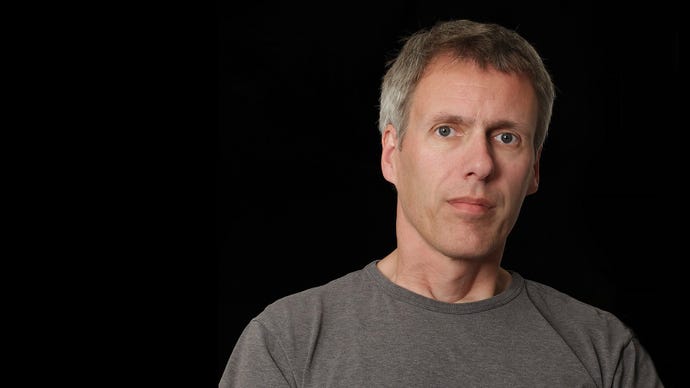How Mick West Went From Making Tony Hawk's Pro Skater to Debunking Conspiracy Theories
This is the story of Mick West: co-founder of Neversoft, and one of the most well-respected conspiracy theory debunkers around.
This article first appeared on USgamer, a partner publication of VG247. Some content, such as this article, has been migrated to VG247 for posterity after USgamer's closure - but it has not been edited or further vetted by the VG247 team.
When Mick West was a kid, a few very profound things happened to him: he lost his faith in God, he realized ghosts and aliens weren't real, and he learned he wasn't psychic. Decades later, he's trying to help others stop believing in their own impossibilities.
West is one of the world's foremost experts on conspiracy theories, specifically debunking them. He's been featured on CNN, the Joe Rogan Experience, and The New York Times. His recent book Escaping the Rabbit Hole: How to Debunk Conspiracy Theories Using Facts, Logic, and Respect is about how to help people believing in far flung, harmful conspiracies. He also just so happens to be one of the three co-founders of the video game studio Neversoft. He even had a heavy hand in programming the first five Tony Hawk's Pro Skater games.
It took West a long time to get from his career in games to his current career debunking conspiracy theories. But as far as West is concerned, his two career paths aren't as dissimilar as they may seem on the surface. In his opinion, he may not be where he is now without that background in programming, testing, and debugging video games. And it's only because of his work in the video game industry that he's able to do the deep-dive analysis on conspiracies he's now known for.
Out Of His League
West's story begins in Bingley, England, a small town about an hour outside of Manchester. At a young age, he was fascinated by the paranormal, UFOs, and stories of alien abductions. He spent a lot of time reading the magazine The Unexplained: Mysteries of Mind, Space and Time, though as he recalls, the stories often petrified him. West also believed he had special powers. As a kid, he read the Roald Dahl short story The Wonderful Story of Henry Sugar, in which the main character, Henry, a gambler, has the ability to see through playing cards. Using that special kind of logic that only children possess, Dahl's story made West believe that he, too, could see through playing cards. Not only that, using his newfound psychic powers, he could will things into existence, such as a winning raffle number.
"Problem gamblers often start out winning a jackpot on a slot machine or something like that, they have this one situation where they get lucky and then they think that that's how it's going to be going on," West tells me. "I had a similar situation where I entered a raffle at school and I bought two tickets with consecutive numbers. I won with the first ticket and then the next number that was drawn was the second ticket. I remember, I was focusing and I was [thinking], 'Be my ticket, be my ticket,' and then I convinced myself that I actually created this thing, this happening."
As he got older, West came to the realization he was not in fact psychic, and that the aliens, UFOs, and ghosts he feared so much as a kid weren't real. He learned that there were rational explanations behind the stories. At the same time, he was also becoming an atheist, abandoning his Catholic faith. The loss of these beliefs, the idea that these paranormal or extraordinary phenomena he once believed true, in fact, were not, stuck with him. "I used to believe in all this stuff and then I stopped believing in all this stuff, and I guess just figuring out why this stuff was wrong became interesting to me," West says.
In his early adult life in the mid-to-late '80s, West would find other ways to scratch that same itch. During his last year of college at the University of Manchester, West spent time on a pre-internet, modem-based bulletin board called FidoNet. It was, as one might expect, extremely slow. Only one person at a time could really post on FidoNet, and even then the modems only exchanged information at night, so two people in conversation could only exchange messages once a day. West would find himself arguing, slowly, with people using FidoNet to spread conspiracy theories. What he'd later make a career, he did in his spare time out of his college apartment.
After graduating from the University of Manchester in 1988, West joined the game industry. He worked for companies such as Binary Design, Tiertex, and Ocean Software, before landing a job in the United States in 1993 at Malibu Interactive, the video game division of the now-defunct Malibu Comics.
"They would take anybody who had a game or two under their belt at that time," he says. "They just flew you over there and started giving you money and put you up in a room."
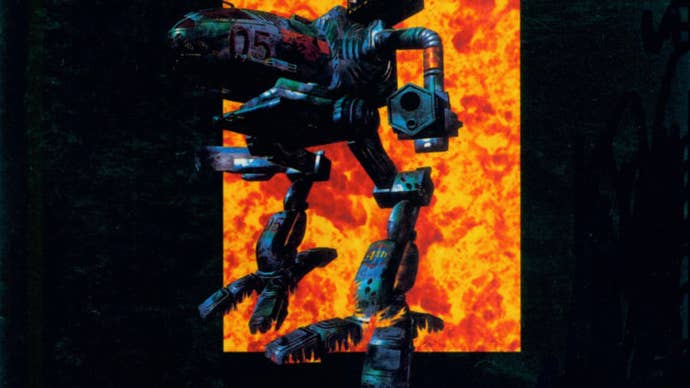
West would only develop one game for Malibu—BattleTech: A Game of Armored Combat, released in 1994 for the Sega Genesis and Super Nintendo—before jumping ship. As he tells it, the writing was already on the wall for the company. Malibu had poor leadership, no exciting games in the pipeline, and most importantly, a lot of employees were leaving to start their own development studios. West would be no different. In July 1994, along with Joel Jewett and Chris Ward, both of whom he'd met working at Malibu, West co-founded Neversoft Entertainment.
West met Ward the first day he lived in the United States, despite having grown up just a few miles from each other in the U.K. He recalls meeting his soon-to-be business partner drinking at the bar of the hotel they were both staying in. He was intimidated by Ward, he says, and felt completely out of his league as a game developer compared to him. "I later discovered that wasn't actually true. I wasn't actually out of my league at all," West says, laughing.
"Chris came across as this scary guy, because he had this long red hair, he dressed kind of weird at the time, and probably still does," West says. "But since we were in the same boat—we were a couple of Yorkshire lads who were out of our element in a way—we'd just hang out together in the hotel bar for the first week or two until we actually got housing over there. Every night, we just went to the hotel and had drinks."
Jewett, on the other hand, had a much less intimidating first impression on West. In fact, he says, he seemed boring. "I think the first time I met Joel he was an accountant from Malibu Comics. He actually started in the Malibu Comics side," West recalls. "He came over and he gave us some talk about [401k plans], or something like that, just some kind of accounting stuff. I thought he was just some kind of boring old accountant. He's like five years older than me, but at that time it seemed like he was an old guy."
Jewett, by all accounts, was not actually a boring guy. In fact, his hard-working, hard-partying lifestyle is what largely fed the culture of Neversoft for almost its entire history. It was a company that put a lot of long hours in, releasing more than 20 games in 20 years. It was also a company known for how much it partied.
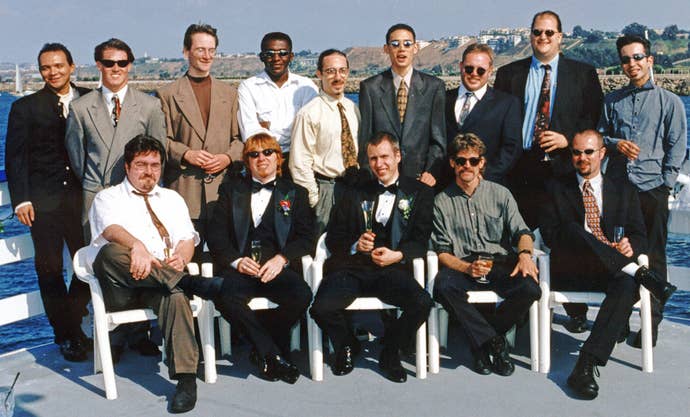
Neversoft was definitely a developer of its time. In the mid-to-late 90s, even more so than now, the game industry was largely male-dominated, full of young, rambunctious guys. As an industry born from people working out of their bedrooms, a lot of good labor and HR practices had not yet been established. Neversoft, as West recalls, was no different.
"The very early days of the video game industry, from my perspective, it was [a] very immature industry full of immature people doing immature things," he says. "Like, we would stay in the office after hours and build forts out of boxes and have little wars where we throw things at each other. [...] It was like we were a bunch of kids just playing around. It was very male dominated. Obviously that's something that's still true to a large extent in the games industry, but then, there were no women at all in our company for quite a while."
West worked at Neversoft for just over nine years, taking a large hand in the programming of all the games it developed, including the landmark Tony Hawk's Pro Skater series. After the release of the first Tony Hawk game in 1999 for the PlayStation, Nintendo 64, and Sega Dreamcast, Neversoft was purchased by the game's publisher, Activision, signed to a four year contract, and expected to turn around a new game every year. Two years into that contract, West decided he wanted something different out of life; he didn't like being told to do the same thing year-after-year. So once the contract was up in 2003 after the release of Neversoft's fifth skateboarding game Tony Hawk's Underground, West resigned.
"Even though you're running the company, the company still has this mandate to produce another Tony Hawk game," West says. "I didn't wanna be doing the same thing all my life, so I left. Which in hindsight wasn't the best financial decision for me. If I'd stayed, like, another four or five years I would've been a lot better off. But yeah, it allowed me to branch out and do other things.
"It wasn't a difficult decision to make. It wasn't hard. I remember going into Joel's office and telling him, I think he kind of half expected it, and he tried to talk me out of it by telling me how much money I would be making if I stayed. I'm kind of a stubborn person where once my mind is made up on something it's rather difficult for people to dissuade me from doing that thing, so I just went ahead and left."
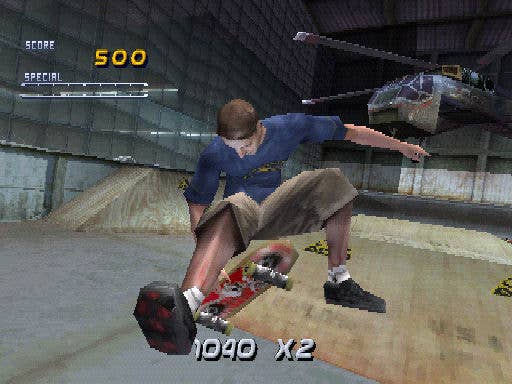
West didn't immediately leave the game industry. He spent some time working as a consultant for various studios, contributing programming and AI work to Treyarch's 2005 game Ultimate Spider-Man and Left Field Productions' 2008 game World Series of Poker 2008: Battle for the Bracelets. For a little while, he thought he would start his own software company, one doing some kind of AI development with natural language processing. But mostly, he just flailed around in his early retirement, trying to find out what exactly he wanted to do next.
"You're so stuck in that industry that you don't really have any frame of reference for what else to do, so you've gotta try to figure it out," West says. "You try a bunch of different things."
One thing West tried: falling down a Wikipedia rabbit hole.
Through the Topsoil
There's a concept called biblical scientific foreknowledge that asserts the Bible can predict scientific knowledge. Attributing this kind of scientific knowledge to the Bible is often used as an argument for it being written by an all-knowing entity, capable of knowledge people at the time couldn't possess. It takes one or two searches on Wikipedia to learn it's largely nonsense.
It was reading about examples of scientific foreknowledge where the trajectory of West's career post-Neversoft started to change drastically. Not unike he would do on FidoNet nearly two decades earlier, West was going on Wikipedia, editing pages and debunking these foreknowledge claims. "I got into a big Wikipedia edit war with some guy who was very religious," West recalls. "That kind of got me interested in, like, presenting information on the internet."
Soon, West was editing Wikipedia pages about Morgellons, a scientifically-unsubstantiated and self-diagnosed skin condition where people claim to have fiber growing out of sores on their skin. According to the Center for Disease Control in 2012, Morgellons has no clear cause and is likely the result of "delusional infestation," which causes people to believe bugs have burrowed under their skin. The fibrous material people were finding on their body were concluded to be cotton from clothing, the CDC reported.
This answer did not satisfy people convinced they were suffering from Morgellons, and for West, attempting to debunk various claims about the disease on Wikipedia, it led to another edit war. So he decided to start his first website: Morgellons Watch.
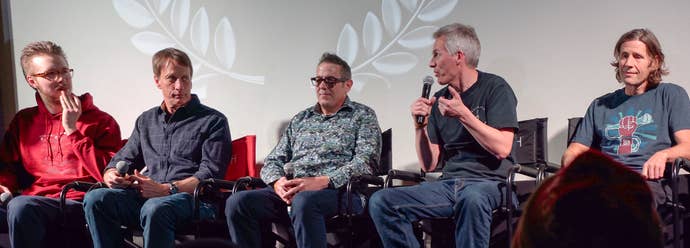
"I figured why should I be editing Wikipedia if people are just going to be changing it all the time," West says. "You have to do very narrowly focused stuff on things that are well sourced; you can't really have a discussion or anything like that [on Wikipedia]."
As West ran his first site, which has posts from April 2006 to January 2012, Morgellons was getting a lot of attention from mainstream news outlets such as The Washington Post and CNN. Morgellons Watch also got its fair share of attention, and those same media outlets were reaching out to West for interviews about the mystery disease. There was only one problem: West was doing all of his debunking anonymously, and at the time, he had no interest in changing that.
"I felt a little bit embarrassed to be doing it at all," West says. "I thought my friends wouldn't understand. Why am I doing this debunking of some weird disease on the internet? It doesn't make any sense."
Not willing to share his identity, the news outlets trying to interview West ended up passing. Nevertheless, he continued his work. But unfortunately, as West puts it, covering Morgellons was a somewhat acrimonious topic. People who felt they were suffering from the disease also had trouble accepting Morgellons wasn't real. At one point, West recalls, someone actually found out who he was and posted his information online. He's also had at least one case of someone using that information to call his house.
West moved onto debunking less divisive topics. His second site, Contrails Science, took aim at chemtrails, a theory that suggests the clouds left behind by flying planes are actually harmful chemicals being released into the air. Conspiracy theorists have alleged chemtrails are bioweapons testing, population control, and even climate engineering. Contrails Science, like Morgellons Watch before it, attracted the attention of mainstream news outlets. But this time, West said yes to interviews.
"I got contacted by CBS and CNN and I kinda decided at that point that I was going to drop my cover and come out into the open," he explains. "I got on TV and it was fine, it was great. I got lots of publicity. My friends and family were not that surprised that I was doing what I was doing."
Then, the attention didn't really stop. Since revealing his identity, West has been interviewed by The New York Times, CBS, and CNN. His appearances on the H3 podcast and the Joe Rogan Experience have collectively been viewed more than two million times on YouTube. He's become one of the media's go-to experts when it comes to niche, obscure conspiracy theories.
Down the Rabbit Hole
"It was a lucky coincidence in a way," West admits. "I retired, I had lots of spare time, I didn't have vast other interests that I was pursuing, and so I was able to focus on these things. I could focus on Morgellons, and I wrote like a hundred little articles on Morgellons. Because I have this background in video game programming and debugging and investigating things, I was able to do fairly deep technical investigations of things. The same thing with the Chemtrails thing—there weren't people writing about chemtrails in depth. I was the only person writing about chemtrails in depth at the time. Probably still now to this day."
West has since started a third website, MetaBunk, which serves as a kind of a catchall for the more obscure conspiracy theories he specializes in. He's now covered everything from UFO sightings, 9/11 being an inside job, and tragedies like the Boston Marathon bombing and the Sandy Hook massacre. He also takes time to respond to theories on Twitter, and even has a podcast called Tales From the Rabbit Hole where he interviews current or former conspiracy theorists.
Seeing the way West interacts with his audience—especially those who don't believe him—it quickly becomes evident he's doing his work from a place of empathy. He's trying to help people that truly believe these conspiracy theories see reality. As he explains it, a lot of people, the theories they've bought into, believe they're following the truth. "They think the other alternative, blindly ignoring this travesty of justice, from their perspective, will be the worst thing [they could] do," West says.
"They think that if you accept the official story of 9/11 as being the most likely explanation, that some hijackers flew the planes into the buildings and they caught fire because of the fires, if you accept that, it's like you're abdicating all your responsibilities for asking questions; you're just blindly accepting the government's story," he says. "They prefer the one where the government is evil. Now, it doesn't mean the government isn't evil, it doesn't mean that people in power aren't corrupt, it doesn't mean politicians aren't corrupt, but it also doesn't mean that they planted bombs in the World Trade Center. Just because politicians are corrupt, it doesn't necessarily follow the World Trade Center was a controlled demolition. This is a hard thing to get across to people, that the government can be right about things. They can be correct and evil. You don't have to go for the silly theory when the sensible one [is] on the other side."
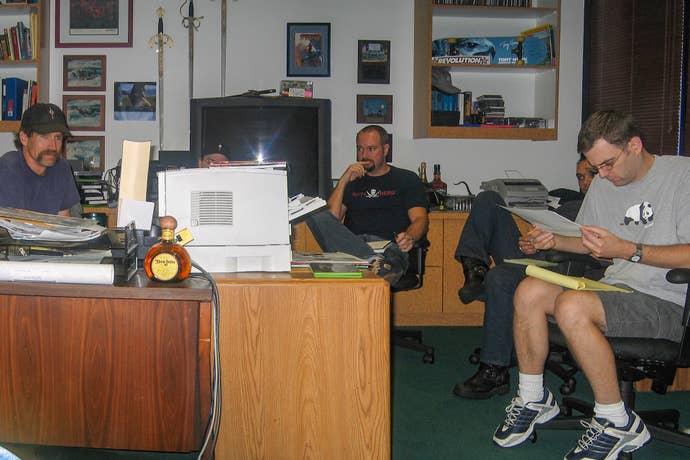
West's job as a conspiracy theory debunker has often got him smacked with claims of being a paid shill, that the government is paying him to do these things. When in reality, no one is paying him. At all.
Until 2017, when his book came out, West had made no money debunking conspiracy theories. Aside from his book, he still makes no money doing it. Of course, it's worth keeping in mind West retired fairly well off with the money he made from Neversoft—something he is quick to admit—but he also wants people to know he does this from a place of sincerity, not of financial gain. "I think it's very important that people understand where you're coming from," West says. While that wasn't always the case, originally he began the work for fun as a hobby where he could investigate things and do science. Over time, West says he really became interested in helping the people who believe in conspiracy theories.
"More and more people would tell me that, you know, 'Mick, I saw your debunk of this and it helped me get out of the rabbit hole,'" he says. "I realized that that was an effect I was actually having, and so I wanted to focus more on that, more on actually helping people. I think it's just become an increasingly important focus of what I'm doing."
West has now been devoting his time to conspiracy theories for well over a decade. But in 2020, he may be facing some of his biggest challenges yet. With the election of Donald Trump as the United States president in 2016, conspiracy theories are no longer obscure beliefs on the fringes of society. They're now a part of our day-to-day, created, perpetuated, and spread by our highest elected officials. More and more, with conspiracies like PizzaGate and QAnon, they're also becoming dangerous to people's personal lives and public safety. In 2017, a man opened fire on the Washington D.C. pizzeria Comet Ping Pong because he believed it was the base of operations for a "Satanic child sex abuse ring involving top Democrats such as Hillary Clinton."
"I think with the whole Fake News thing and Donald Trump pushing these conspiracy theories, it has extended the reach of conspiracy theories to a wider audience," West says, adding that while he doesn't think this is wholly a new thing, it does seem that society's taken a step backward when it comes to its trust in the mainstream American media, for two reasons. "One of which is [Trump] telling people about the lying press and things like that, and people believing him. The other is the decay of traditional news information sources in the age of the internet and social media, which has really changed the way people consume their news and has led to it being easier for disinformation to spread because people are much more compartmentalized now."
As the media landscape continues to evolve, West says he'll continue to evolve to be able to reach as many people as possible. Some of his methods will be focused on grassroots tactics, like joining 9/11 conspiracy groups on Facebook to talk to people or doing live Discord calls with theorists. Or, "actually engaging people directly in a way [where] multiple people can see it," he says. As technology and AI continue to be a major force in the world, other methods he's considering are a bit of a return to his roots.
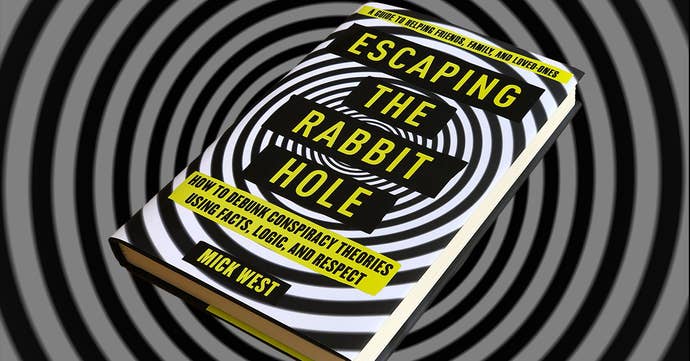
"AI is going to be able to basically read things like tweets, Facebook posts, and even news stories and be able to understand them and provide context for these things," West says. "I think there's going to be something of an arms race with disinformation and misinformation and propaganda, and AI is going to become a large part of that. This is actually something I'm planning on looking into, is doing a little bit of programming and trying to figure out ways I can use AI as a force multiplier to actually reach more people."
West is fighting misinformation, cognitive dissonance, and a willful ignorance to the truth. While it feels like a far cry from his work at Neversoft, as far as he's concerned, it's not. For one, he's always been interested in the weird, obscure, or paranormal. But also, his investigations, they're not all that different from programming or fixing bugs in video games. He's still diving deep into a problem, doing the dirty work, and finding the solution.
"In some ways, those two things merged together to make me what I am now," he says. "You know, it kind of all came together in that final end result."
